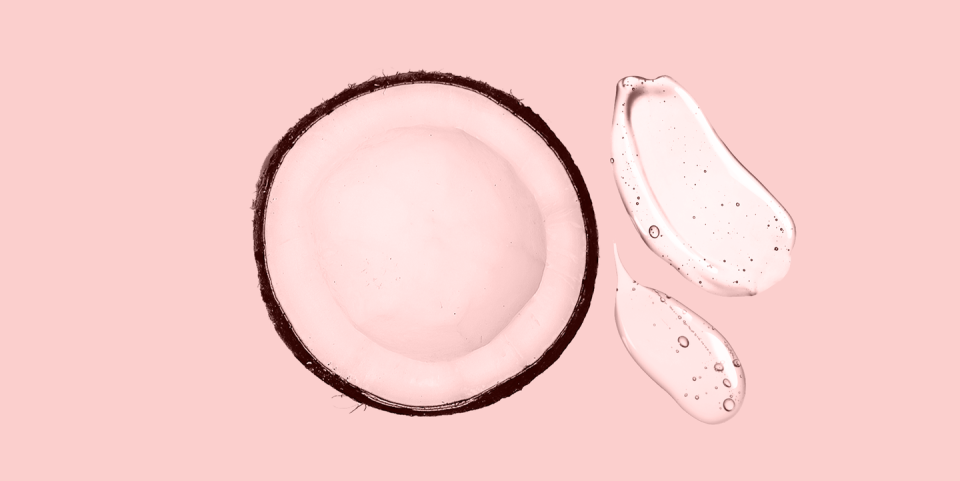Is Coconut Oil the Secret to Stronger, Healthier Hair?

Natural oils like castor oil have been beauty staples for years, essential oils are more popular than ever, and body oils are an excellent way to moisturize. But coconut oil deserves a spot in your self-care routine, too, because it makes for a top-notch conditioning treatment.
"Coconut oil is unique because it's similar to hair's natural lipid structure and able to penetrate the hair more than other oils," says Leo Izquierdo, co-founder of IGK Hair Care, a brand that uses coconut oil in many of its products.
If it sounds like your hair could benefit from a little tender love and coconut, here are all the answers to your questions about incorporating the ingredient into your routine:
What are the benefits of coconut oil for hair?
"When applied on a regular basis (two to three times per week if your hair type is normal to coarse; less often if you have fine hair), coconut oil can enhance hair's lubrication, making it easier to comb and manage, while increasing shine and preventing frizz," explains GH Beauty Lab senior chemist Sabina Wizemann. It's especially useful on damaged hair because it helps protect the hair shaft from becoming waterlogged, which "can eventually increase further cuticle lifting and damage," she says.
Does coconut oil work for hair growth and thickness?
Not exactly, but it can strengthen hair. One study found that coconut oil can penetrate strands, helping "reduce the protein loss remarkably for both undamaged and damaged hair" with regular use. And while some reports have suggested that coconut oil can help promote hair growth or other concerns, "it isn't a medical treatment," Izquierdo says. "For anything like dandruff, hair loss or scalp irritation, it's best to see a doctor."
What kind of coconut oil is best for hair?
Some people use organic, cooking, unrefined or pure coconut oil straight from the jar as a hair treatment. We especially love a conditioner, deep treatment mask, or leave-in conditioner that lists coconut oil as a top ingredient: This helps to avoid overdoing it and weighing down your strands. (See the Good Housekeeping Institute Beauty Lab top-tested, GH Seal star, and Beauty Award-winning picks, below.) If you're opting for pure coconut oil, though, our pros recommend a raw one like Garden of Life Organic Extra Virgin Coconut Oil.
How to use coconut oil as a hair mask
Our pros recommend using it as a prewash before shampooing to "protect hair from absorbing too much water," says Wizemann says. It also cuts down on frizz and makes hair easier to style post-shower. Here's the best way to apply it:
Choose raw coconut oil, like Garden of Life Organic Extra Virgin Coconut Oil.
Smooth coconut oil onto hair and comb it through dry hair.
Leave it on for at 15 to 30 minutes to let it absorb.
Thoroughly wash hair with a great shampoo (you may need to shampoo twice to remove all of the oil) and conditioning as usual.
Pro tip: "If you have an oily scalp, only use it on the middle and end sections of your hair," cautions Brooke Evans, a L'Oréal Professionnel national artist.
How to use coconut oil as an overnight treatment
Leaving coconut oil on overnight will give you the "maximum benefits" of coconut oil, Wizemann says, and "should provide a sleeker look and softer feeling hair" after you shampoo. For a more intensive treatment:
Apply raw coconut oil to dry hair and comb through.
Wrap hair tightly in a shower cap, old scarf or towel before bed.
Wash out the following morning remembering you may have to shampoo twice to fully remove the oil and follow with your normal conditioner.
Pro tip: If you have oily skin, try mixing a small amount of coconut oil into your conditioner.
How to use coconut oil to style hair
If the idea of applying oil to your hair makes you nervous, you can start small by using a tiny amount to tame frizz and applying it to the ends of your hair. Just rub a bit between hands and comb or scrunch through ends. "This will leave a polished, shiny look," says celebrity hairstylist Andrew Fitzsimons. He recommends using Alterna Haircare Caviar Anti-Aging Anti-Frizz Blowout Butter, which "tames frizz while protecting hair from heat-styling and humidity."
Can coconut oil be bad for your hair?
No, coconut oil can't make your hair fall out as the rumor goes! In general, though, you should probably avoid coconut oil if you have oily skin, because it can clog pores and "cause breakouts around the hairline in people who don't tolerate oils well on their skin," says Wizemann.
You Might Also Like

